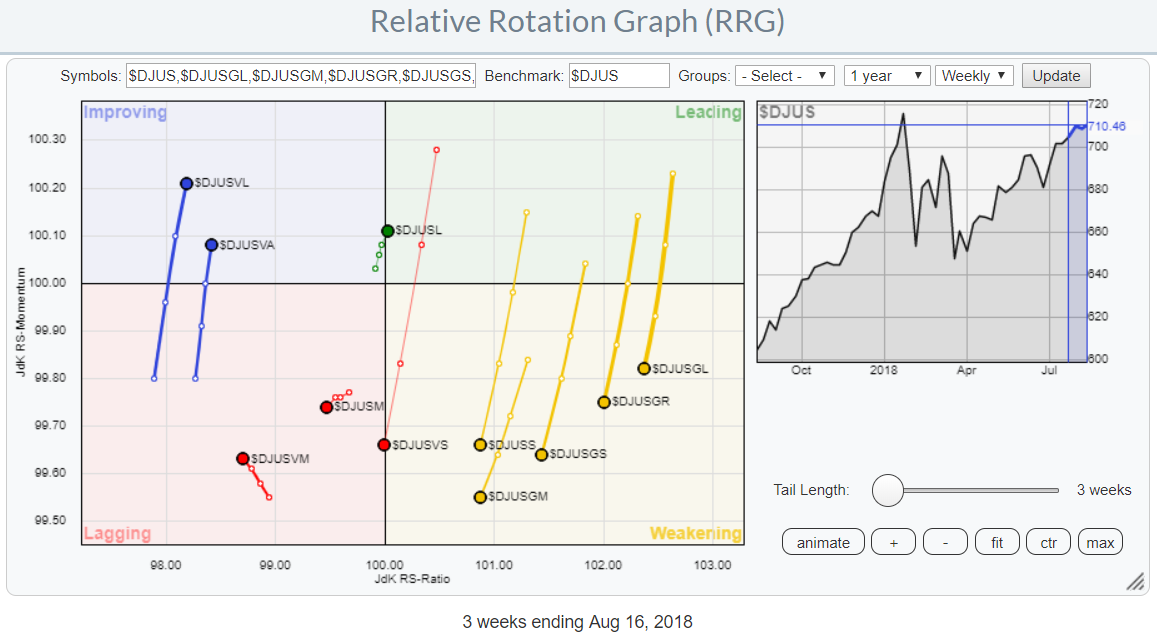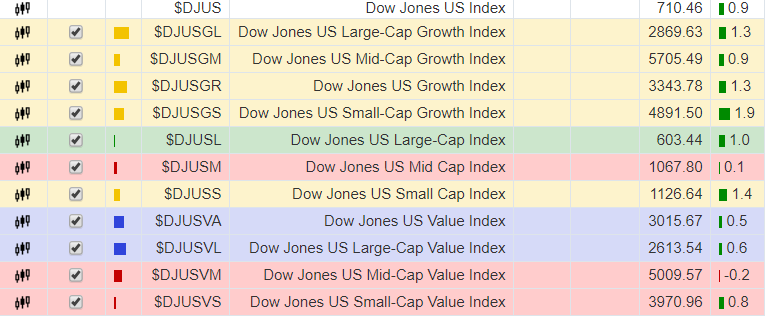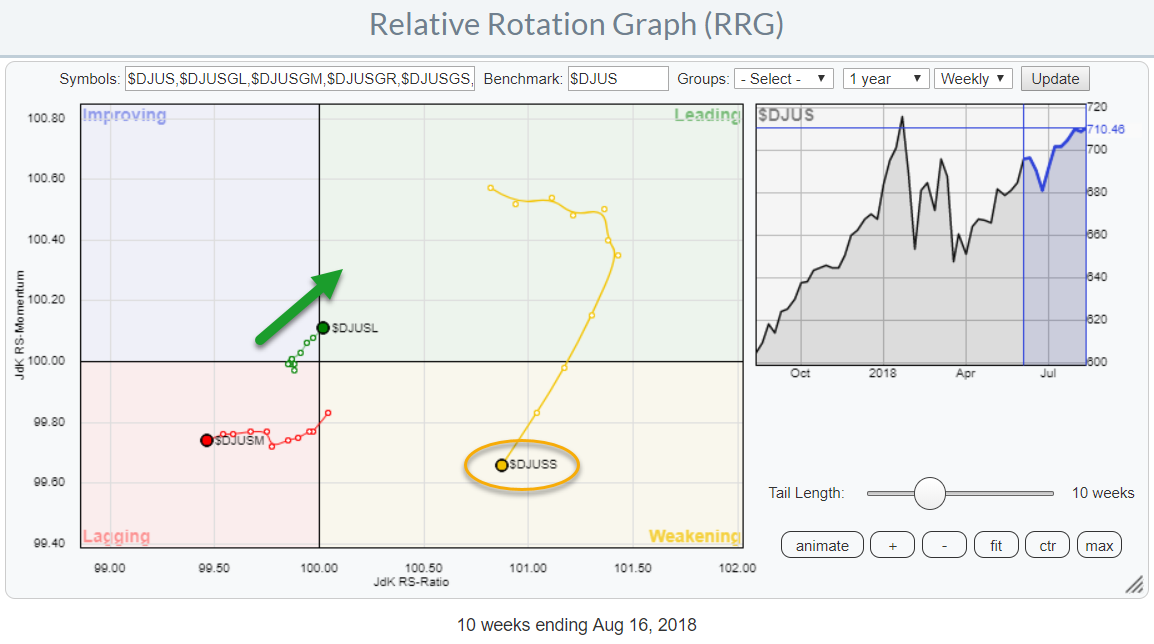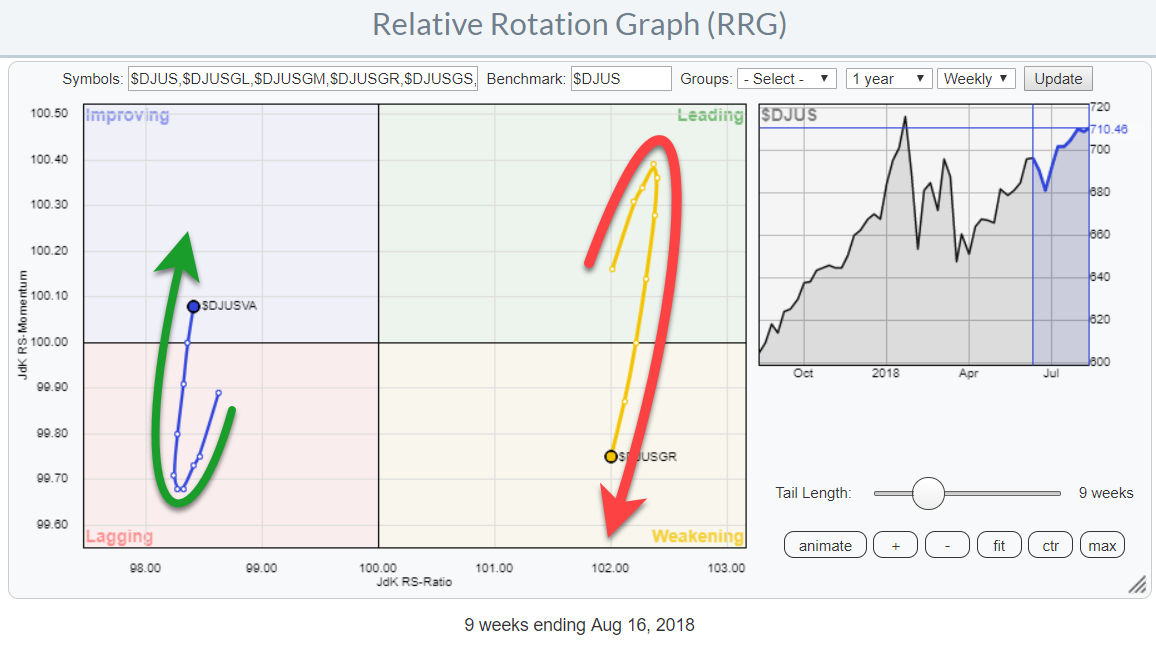 Instead of showing asset class rotation or sector rotation, Relative Rotation Graphs can also be used to show rotation among various market segments.
Instead of showing asset class rotation or sector rotation, Relative Rotation Graphs can also be used to show rotation among various market segments.
You have all seen or heard about a breakdown of the market in large-, mid-, and small-cap stocks. And maybe also the breakdown between growth and value stocks.
The stock market can be seen from a lot of different angles. The good news is that index providers like Dow Jones are providing us with indexes that capture all these different market segments.
In this post, I want to show you how you can use Relative Rotation Graphs to get a perspective on the rotation of the Growth and Values segments of the market broken down into the large-, mid-, and small-cap buckets.
Three different angles
The RRG above shows the US stock market broken down in three different ways using various indexes provided by Dow Jones. The benchmark for this RRG and all others in this article is $DJUS which is the Dow Jones US index.
1. Growth vs Value.
The tickers $DJUSGR and $DJUSVA represent the Growth and Value segments of the US market. Stocks will be included in one or the other based on their fundamental characteristics.
So inclusion in either one of these indexes is NOT based on price action but on fundamental characteristics. The composition of these indexes does not change very often.
2. Size segments.
The tickers $DJUSL, $DJUSM, and $DJUSS represent the Large-, Mid-, and Small-cap segments of the market. The inclusion of stocks in one of these groups is based on their market capitalization.
Large-cap us considered a market capitalization above U$ 10 billion. Mid-cap between U$ 2 - 10 billion and Small-cap below U$ 2 billion.
The composition of these groups changes periodically based on the market capitalization which is influenced by price movement but these changes tend to be limited in numbers.
3. Growth and Value, broken-down into size segments.
$DJUSGL, $DJUSGM, and $DJUSGS represent Growth-Large, Growth-Mid, and Growth-Small. And on the other side of the spectrum, we have $DJUSVL, $DJUSVM, and $DJUSVS representing Value-Large, Value-Mid, and Value-Small.
Each of these three breakdowns can be plotted on a Relative Rotation Graph with $DJUS as the benchmark and be considered a closed universe (this is a universe where all indexes on the RRG together are the benchmark).
Growth and Value together are the DJ US market. The three size segments together are the DJ US market and also the six indexes representing Growth and Value stocks broken down to size form the DJ US market.
The table below lists all indexes mentioned.
 So plotting all the indexes mentioned above on one RRG against $DJUS shows the total US market seen from three different perspectives.
So plotting all the indexes mentioned above on one RRG against $DJUS shows the total US market seen from three different perspectives.
Size segments
 If we zoom in on the Relative Rotation Graph showing the three size segments against the DJ US Index, it is the long tail on the small-cap index that attracts the attention.
If we zoom in on the Relative Rotation Graph showing the three size segments against the DJ US Index, it is the long tail on the small-cap index that attracts the attention.
The strong rotation from leading into weakening almost straight down indicates a rapid loss of relative momentum, something that signals caution.
The mid-cap index is already well inside the lagging quadrant, leaving only the large-cap segment at a positive RRG-heading and almost crossing over into the leading quadrant.
Hence, from a relative perspective, it is now time to prefer large-cap stocks over mid- and small-caps.
Growth vs Value
 Shifting to the growth vs value break down the opposite rotation in favor of value stands out.
Shifting to the growth vs value break down the opposite rotation in favor of value stands out.
Although growth is still on the right-hand, positive, side of the graph and value is on the left-hand negative side the recent rotation suggests money is flowing from growth into value.
For the time being this is primarily a momentum driven move but the tails are already starting to move towards each other on the RS-Ratio scale causing an opposite rotation indicating, at least a temporary, move in favor of value stocks over growth.
In the latest RRG blog, you will find a more in-depth view following this setup in combination with some individual charts.
Let me know what you think of this usage of RRG in the comments below. If you would like to receive a notification when a new RRG blog article is published, simply "Subscribe" with your email address.
Julius de Kempenaer | RRG Research
RRG, Relative Rotation Graphs, JdK RS-Ratio, and JdK RS-Momentum are registered TradeMarks ®; of RRG Research
Follow RRG Research on social media:
If you want to discuss RRG with me on SCAN, please use my handle Julius_RRG so that I will get a notification.
